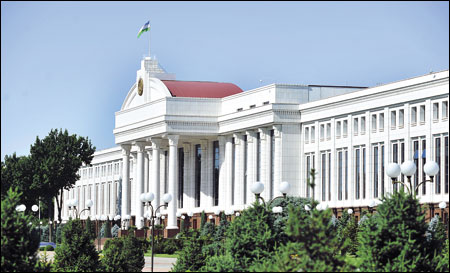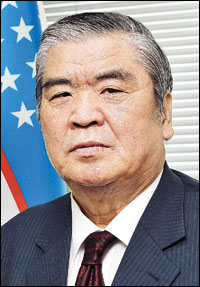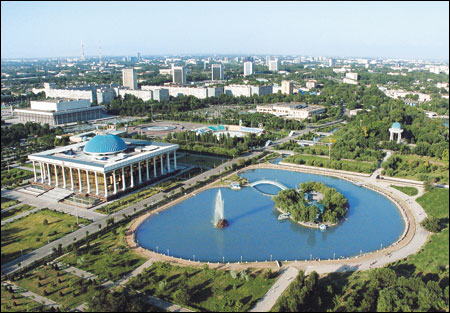
Vitali Fen, Uzbek ambassador to Korea, contributed the following article to The Korea Times on the occasion of the 20th anniversary of the nation’s Constitution Day. — ED.

It is my pleasure to address to the esteemed readers of The Korea Times on the occasion of 20th anniversary of the Constitution Day of Uzbekistan which is celebrated on Dec. 8.
I am particularly pleased that this year’s celebration coincides with the 20th anniversary of the establishment of diplomatic relations between Uzbekistan and South Korea that gives it especial festivity.
On Aug. 31, 1991, the national independence of Republic of Uzbekistan was declared. At that time, many of us could not even imagine what kind of complex and difficult challenges were facing the young independent state, which appeared on the world map.
The most serious threat was posed by the legal vacuum in the breakdown of internal and external security, the risk of inter-ethnic, inter-religious, inter-regional and clan conflicts, and the growth of radicalism. In a nutshell, it was necessary to protect the nation from internal and external conflicts that have their roots in the period of the last years of the Soviet Union.
During that difficult time, it was essential to acquire self-preservation, endurance and strong political will, and to develop a comprehensively considered and calibrated strategy for pulling the country out of the deep crisis and mobilizing constructive power of the society for that purpose.
The strategy of political and economic development as well as of construction of the nation and society, which is developed with the direct involvement of Uzbekistan President Islam Karimov, had its foundation on the historical and cultural features of our people taking into account huge natural resources, economic and human potential of the nation.

In a historically short period of time, the Constitution of the Republic of Uzbekistan, has been developed and adopted, which clearly sets out the basic principles of state and nation building of the country.
The Constitution of the Republic of Uzbekistan has been a product of fruitful and laborious work of the Constitutional Commission headed by President Karimov.
It was approved on Dec. 8, 1992 and leans on the advanced ideas of the constitutional construction, democratic principles and historical experience of development of the Uzbek statehood. The Constitution has been given high estimation on the part of the international organizations and advanced democracies of the world.
The Constitution determines the basic directions of socio-political development of Uzbekistan. It stipulates that human-being, his life, freedom, honor, dignity and other inalienable rights are the most supreme value and given this postulate legal regulation of mutual relations between citizens, society and state are founded.
The Basic Law does emphasize the state’s adherence to human rights and principles of the state sovereignty, its responsibility before the present and future generations, value of historical experience of development of the national statehood, a priority of internationally recognized legal principles, aspiration of maintenance of a decent life to citizens of the country, the national consent and the civil accord, as well as construction of a democratic and lawful state.
The main essence of the Constitution is made with recognition of the fact that people are unique source of the state power, and the state in turn serves the interests of its people that are reflected in each clause of the Basic Law.
For the past 20 years the Constitution has been a legal basis for maintenance of socio-political progress of the country, its economic development, for providing a decent and stable life for each citizen of the country and multinational Uzbek society as a whole.
The Constitution of Uzbekistan encompasses a complete system of principles of democratic constitutional building, such as democracy, division of branches of power, state sovereignty, supremacy of the Constitution and the Law, political pluralism, variety of forms of economic activity, social character of the state, and full integration of Uzbekistan into the world community.
Uzbekistan’s current high international standing, sustainable economic development, deepening social-political reforms in the country – these are the results of the strategic course that has been coherently pursued by the government of Uzbekistan over past 21 years.
Our Constitution has played an important role in this process laying a solid legal basis for the development of the country.
The Constitution of Uzbekistan clearly defines provisions pertaining to honoring rights and legitimate interests of non-governmental public organizations that is a prerequisite for strengthening democratic processes in the country.
In Uzbekistan they have become an indispensable part of our society and make their contribution to our country’s development.
It is noteworthy to say that comprehensive reforms in Uzbekistan are carried out on a consecutive, stage-by-stage basis. Over the past few years the principle of division of legislative, executive and judicial power stipulated by the Basic Law has been further strengthened.
In particular, the Constitutional Law on formation of two-chamber parliament has been adopted and the advanced system of legislative activity was created. Tasks and proxies of both chambers of Oliy Majlis (the national parliament) – the Senate and Legislative Chamber in sphere of the state governing have legislatively been laid out. Mechanism of lawmaking, holding debates, passing laws and its implementation has been advanced too.
Such amendments served as a major landmark in the sphere of strengthening the role of the executive branch of power, and modernization of the society and its further democratization.
In particular, procedure of appointment of Prime Minister of Uzbekistan and hokims (governors) of regions and city of Tashkent, as well as their dismissal has been significantly streamlined.
My country has furthered reforms on liberalization of criminal punishment too. In particular, abolition of capital punishment, introduction of institute of reconciliation, mitigation of punishment on several kinds of crimes, application of punishment other than imprisonment to people who have followed the way of corrections are in fully conformity with such features of national mentality, as forgiveness and kindliness.
Today the Oliy Majlis of the Republic of Uzbekistan has become an effective and mobile parliament, not only with respect of adopting laws, but also as an active tool of initiating and implementing economic and democratic reforms. The members of the two its chambers – Legislative Chamber and Senate, actively participate in further promoting political processes in the country.
In conclusion, taking this opportunity, I would like to wish to the esteemed readers of this reputed newspaper every success in all their endeavors, longevity and well-being.




